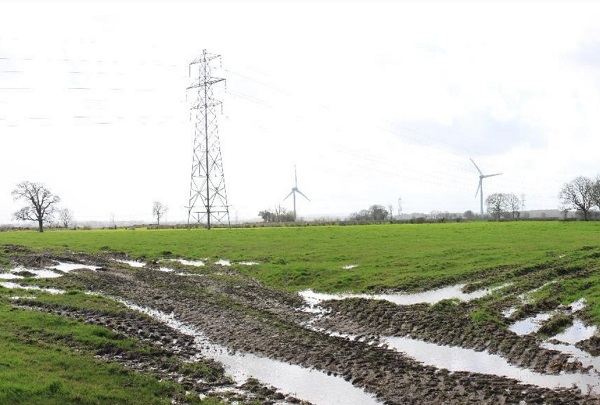COUNCILLORS have thrown out plans for a massive battery storage compound near Alveston after being told it would “industrialise” the greenbelt.
Villagers raised fears of “toxic gas plumes in a lithium explosion” near homes to members of South Gloucestershire Council’s development management committee, which refused the application in May.
But the fate of the proposed plant now lies in the hands of a more senior planning committee, because the decision went against officers’ advice to approve.
The 200-megawatt facility at Earthcott Green Farm, near Alveston, would store energy produced by renewable sources such as solar for when it is needed most during peak hours, and could power 500,000 homes for two hours during an outage on the National Grid, preventing a blackout.
It would have 176 battery storage containers, each measuring 3m (about 9ft 10in) high and 6m long, a 15m communication tower, substation, transformers, 4m lighting/CCTV columns and a 2.5m perimeter fence surrounding the six-hectare (about 15 acres) site.
A planning officer told the committee that it would result in the “industrialisation” of a rural area and was deemed generally “inappropriate development” – but that the public benefits outweighed the harms, and recommended granting permission.
Members voted 5-3 to refuse permission.
Alveston parish councillor Marion Reeve told the meeting: “It’s not like a battery you put in a car, lithium is much more dangerous.
“The concern is this is so close to residential properties – these people are at risk of toxic gas plumes in a lithium explosion.
“We are not talking about a torch battery, we are talking about something quite dangerous.
“You wouldn’t dream of putting a nuclear system 120 yards from houses.”
A fire in 2020 at a battery energy storage system in Liverpool, which had a capacity 10 times smaller than the proposed Earthcott Green plant, took 59 hours to extinguish and created a “significant blast”, councillors were told.
Residents said they would suffer from noise and light pollution, which could also affect protected species.
Boss insists technology is safe
Robert Miles, chief executive and founder of Dursley-based applicants Immersa, said: “I can categorically reassure members that the technology being proposed today is safe.
“Not only are we proposing a different technology to the small number of reported incidents but they are highly sophisticated, have numerous built-in fail-safes and are monitored 24 hours a day.
“The high-pressure gas that most of us have connected to our homes has a greater chance of explosion and fire than the batteries we use.”
Mr Miles said there was no objection from the fire service and that the site, which has low-quality agricultural soil, had been chosen because it was near a substation connecting the national and local electricity networks.
The council’s ecologist and landscape officer deemed the plans to be acceptable with conditions such as tree and hedgerow planting.
‘Absolutely inappropriate’ development
Cllr Paul Hughes (Con, Bitton & Oldland Common) said: “This is absolutely inappropriate development in the greenbelt. It has no justification whatsoever.
“It’s a massive experiment that this country is going through with green energy – that people can put an industrial complex in the middle of the countryside is just unbelievable.
“Before we know where we are, half of South Gloucestershire will be covered in solar batteries.
“I’m absolutely incensed by this thing.”
June Bamford (Con, Hanham) said: “Throughout the officer’s report we’re told there will be harm to the greenbelt and heritage assets.
“This application is wholesale industrialisation in the greenbelt with these massive containers and associated structures.”
She said officers had assessed that the site would still be visible from some viewpoints after 15 years of plant and tree growth.
Jayne Stansfield (Lib Dem, Thornbury) said the facility was “just a bigger version” of a house that uses electricity from solar panels in the day then batteries stored in a garage at night.
The plans will go to the spatial planning committee for a final decision on a date to be fixed.
*Residents will once again have the right to speak when councillors visit the sites of potentially controversial planning applications in South Gloucestershire.
A decision at a council meeting on May 15 reversed a change made in 2018 which meant members of the public could not speak directly with councillors to point out issues they felt should be considered.
The council has also voted to remove the power of committee chairs to veto planning applications being considered, which will only be possible if two of the three political groups on the council agree.
By Adam Postans, Local Democracy Reporting Service


